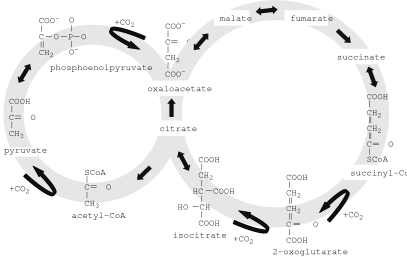Figure 2.
Reverse (reductive) TCA cycle. The rTCA cycle is a carbon dioxide fixation pathway found in autotrophic eubacteria and archaea. It is considered to be a primordial pathway for the production of starting organic molecules for the biosynthesis of sugars, lipids, amino acids, pyrimidines and pyrroles. The rTCA cycle is largely the oxidative, catabolic TCA cycle operating in reverse. Most of the enzymes of the TCA cycle work reversibly and could catalyse both directions. Only three steps are thought to be non-reversible, and thus determine the oxidative or reductive direction of the cycle: the conversion of citrate to oxaloacetate and acetyl-CoA; the conversion of fumarate to succinate; and the conversion of 2-ketoglutarate to isocitrate. The presence of such enzyme activities in autotrophically grown bacteria and archaea is considered indicative of the presence of the rTCA cycle in these organisms.

